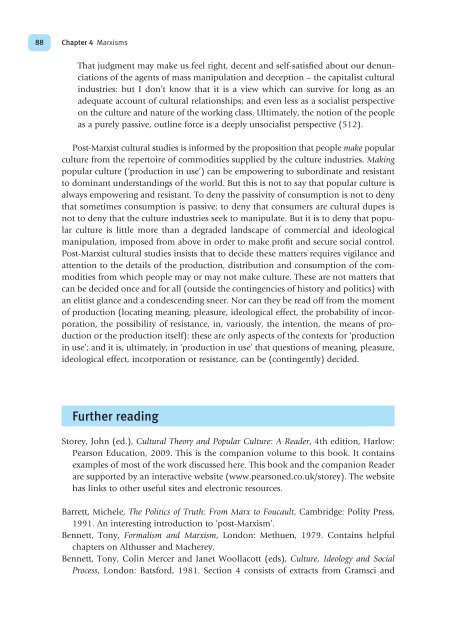Cultural Theory and Popular Culture
Cultural Theory and Popular Culture
Cultural Theory and Popular Culture
Create successful ePaper yourself
Turn your PDF publications into a flip-book with our unique Google optimized e-Paper software.
88<br />
Chapter 4 Marxisms<br />
That judgment may make us feel right, decent <strong>and</strong> self-satisfied about our denunciations<br />
of the agents of mass manipulation <strong>and</strong> deception – the capitalist cultural<br />
industries: but I don’t know that it is a view which can survive for long as an<br />
adequate account of cultural relationships; <strong>and</strong> even less as a socialist perspective<br />
on the culture <strong>and</strong> nature of the working class. Ultimately, the notion of the people<br />
as a purely passive, outline force is a deeply unsocialist perspective (512).<br />
Post-Marxist cultural studies is informed by the proposition that people make popular<br />
culture from the repertoire of commodities supplied by the culture industries. Making<br />
popular culture (‘production in use’) can be empowering to subordinate <strong>and</strong> resistant<br />
to dominant underst<strong>and</strong>ings of the world. But this is not to say that popular culture is<br />
always empowering <strong>and</strong> resistant. To deny the passivity of consumption is not to deny<br />
that sometimes consumption is passive; to deny that consumers are cultural dupes is<br />
not to deny that the culture industries seek to manipulate. But it is to deny that popular<br />
culture is little more than a degraded l<strong>and</strong>scape of commercial <strong>and</strong> ideological<br />
manipulation, imposed from above in order to make profit <strong>and</strong> secure social control.<br />
Post-Marxist cultural studies insists that to decide these matters requires vigilance <strong>and</strong><br />
attention to the details of the production, distribution <strong>and</strong> consumption of the commodities<br />
from which people may or may not make culture. These are not matters that<br />
can be decided once <strong>and</strong> for all (outside the contingencies of history <strong>and</strong> politics) with<br />
an elitist glance <strong>and</strong> a condescending sneer. Nor can they be read off from the moment<br />
of production (locating meaning, pleasure, ideological effect, the probability of incorporation,<br />
the possibility of resistance, in, variously, the intention, the means of production<br />
or the production itself): these are only aspects of the contexts for ‘production<br />
in use’; <strong>and</strong> it is, ultimately, in ‘production in use’ that questions of meaning, pleasure,<br />
ideological effect, incorporation or resistance, can be (contingently) decided.<br />
Further reading<br />
Storey, John (ed.), <strong>Cultural</strong> <strong>Theory</strong> <strong>and</strong> <strong>Popular</strong> <strong>Culture</strong>: A Reader, 4th edition, Harlow:<br />
Pearson Education, 2009. This is the companion volume to this book. It contains<br />
examples of most of the work discussed here. This book <strong>and</strong> the companion Reader<br />
are supported by an interactive website (www.pearsoned.co.uk/storey). The website<br />
has links to other useful sites <strong>and</strong> electronic resources.<br />
Barrett, Michele, The Politics of Truth: From Marx to Foucault, Cambridge: Polity Press,<br />
1991. An interesting introduction to ‘post-Marxism’.<br />
Bennett, Tony, Formalism <strong>and</strong> Marxism, London: Methuen, 1979. Contains helpful<br />
chapters on Althusser <strong>and</strong> Macherey.<br />
Bennett, Tony, Colin Mercer <strong>and</strong> Janet Woollacott (eds), <strong>Culture</strong>, Ideology <strong>and</strong> Social<br />
Process, London: Batsford, 1981. Section 4 consists of extracts from Gramsci <strong>and</strong>
















